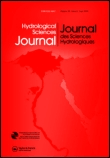
Hydrological Sciences Journal
Scope & Guideline
Bridging research and practice in hydrological sciences.
Introduction
Aims and Scopes
- Hydrological Modeling and Simulation:
The journal emphasizes the development and application of hydrological models, including both traditional and data-driven approaches, to simulate various hydrological processes such as streamflow, groundwater recharge, and sediment transport. - Climate Change Impacts and Adaptation:
A consistent focus is placed on understanding the impacts of climate change on hydrological processes, including alterations in precipitation patterns, streamflow variability, and water resource management strategies. - Integrated Water Resources Management (IWRM):
Research related to IWRM is highlighted, emphasizing the need for holistic approaches to manage water resources sustainably while considering socio-economic and environmental factors. - Socio-Hydrology and Human Dimensions:
The journal encourages interdisciplinary studies that explore the interactions between hydrological systems and human activities, including water governance, policy implications, and community responses to hydrological changes. - Remote Sensing and Data Assimilation:
There is a strong emphasis on utilizing remote sensing technologies and data assimilation techniques to enhance hydrological predictions and improve the understanding of water cycle dynamics. - Hydrological Extremes and Risk Assessment:
Research on hydrological extremes, such as floods and droughts, is a key focus area, including the assessment of risks and the development of predictive models to mitigate the impacts of these events.
Trending and Emerging
- Machine Learning and Artificial Intelligence Applications:
There is a growing trend in the application of machine learning and artificial intelligence techniques for hydrological modeling, prediction, and data analysis, reflecting the increasing integration of computational methods in hydrological research. - Climate Resilience and Adaptive Management:
Research focusing on climate resilience and adaptive management strategies in response to hydrological changes is on the rise, emphasizing the importance of sustainable practices in water management amid climate variability. - Hydrological Response to Land Use Changes:
Emerging studies are increasingly investigating the impacts of land use changes on hydrological responses, highlighting the interactions between anthropogenic activities and natural hydrological processes. - Sustainable Water Resource Management:
There is a notable increase in research related to sustainable water resource management practices, particularly those that incorporate stakeholder engagement and socio-hydrological frameworks. - Hydrological Data Integration and Remote Sensing:
The trend towards integrating diverse datasets, including remote sensing and ground-based observations, is growing, allowing for more comprehensive assessments of hydrological processes and improved modeling accuracy. - Water Quality and Pollution Studies:
Research focused on water quality assessment and pollution sources is gaining traction, reflecting an increased awareness of the importance of maintaining water quality in hydrological studies.
Declining or Waning
- Traditional Hydraulic Engineering Approaches:
There has been a noticeable decrease in the publication of papers focused solely on conventional hydraulic engineering methods, indicating a shift towards more integrated and interdisciplinary approaches that consider environmental and socio-economic factors. - Local Case Studies without Broader Implications:
Research that is highly localized and lacks broader applicability or generalization has seen a reduction, as the journal increasingly favors studies that contribute to global understanding or have implications across different regions. - Descriptive Studies without Quantitative Analysis:
There is a declining trend in purely descriptive studies that do not incorporate quantitative analysis or modeling, as the journal emphasizes empirical research that provides measurable insights into hydrological processes.
Similar Journals
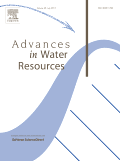
ADVANCES IN WATER RESOURCES
Advancing water science for a sustainable future.ADVANCES IN WATER RESOURCES is a premier peer-reviewed journal published by Elsevier Science Ltd, dedicated to advancing the field of water science and technology since its inception in 1977. With an impressive Q1 ranking in the field, this journal provides a vital platform for researchers, professionals, and students to disseminate cutting-edge research that addresses critical issues related to water resources management, hydrology, and environmental sustainability. The journal offers a comprehensive collection of articles that explore innovative methodologies, policy implications, and case studies that shape the future of water resource management. Although it does not provide open access, its impactful contributions are recognized globally, making it an essential resource for anyone engaged in water science. The journal continues to publish relevant research while looking forward to bridging the gap between theoretical insights and practical applications up until 2024.
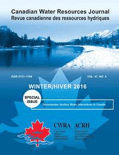
Canadian Water Resources Journal
Exploring the depths of water science and technology.Canadian Water Resources Journal, published by Taylor & Francis Inc, is a leading academic journal dedicated to the field of water science and technology. With a significant history dating back to its inception in 1976, the journal offers a platform for high-quality, peer-reviewed research that addresses critical issues in water resources management, hydrology, water quality, and policy. The journal is recognized for its valuable contributions to the field, exemplified by its classification in the Q2 category for Water Science and Technology and holding a respectable rank of #137 out of 261 in the Scopus Environmental Science category. While it does not currently offer open access, its articles remain accessible through various institutional subscriptions, ensuring that professionals, researchers, and students stay updated with the latest advancements and discussions in water resources. As it converges towards its ongoing publication commitment through 2024, the Canadian Water Resources Journal remains an essential resource for those engaged in the pursuit of sustainable water management solutions.

JOURNAL OF HYDROMETEOROLOGY
Connecting Scholars Through Atmospheric DiscoveriesJOURNAL OF HYDROMETEOROLOGY, published by the American Meteorological Society, is a leading scholarly journal that serves as a vital resource within the field of atmospheric science. With its ISSN 1525-755X and E-ISSN 1525-7541, this journal provides a platform for the dissemination of high-impact research, currently holding a prestigious Q1 ranking in Atmospheric Science as per the 2023 Category Quartiles. It enjoys an excellent reputation, ranked #30 out of 148 in the Scopus listings, placing it in the top 80th percentile within Earth and Planetary Sciences. Publishing rigorous and innovative studies from 2000 to 2024 and beyond, the journal addresses critical topics including weather forecasting, climate dynamics, and hydrological processes, making it essential reading for researchers, professionals, and students alike. Though not an open-access journal, it continues to enrich the academic community with quality contributions dedicated to advancing our understanding of hydrometeorological phenomena.
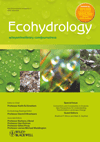
Ecohydrology
Transforming Research into Ecological InsightsEcohydrology is a prestigious academic journal published by WILEY that focuses on the interplay between ecological and hydrological systems. With a robust ISSN of 1936-0584 and E-ISSN 1936-0592, it has established itself as a leading source in its field since its inception in 2009. Positioned in the top quartile (Q1) of various categories, including Aquatic Science, Earth-Surface Processes, and Ecology, the journal leverages its high impact factor to attract significant scholarly contributions. The recent rankings in Scopus place Ecohydrology among the top-tier journals, with notable percentile standings—79th in Ecology, Evolution, Behavior and Systematics, and 77th in both Aquatic Science and Environmental Science. Aimed at researchers, professionals, and students, the journal provides a vital platform for disseminating new insights and methodologies that address pressing environmental challenges. Despite not being an open-access journal, Ecohydrology offers a wealth of knowledge that is crucial for advancing our understanding of ecosystem dynamics and sustainable water resource management.

Water Research X
Empowering researchers to tackle global water challenges.Water Research X is a prestigious journal published by ELSEVIER, focusing on the dynamic fields of water science and technology, pollution, ecological modeling, and waste management. Since its inception in 2018, this Open Access journal has become a cornerstone resource for researchers and professionals dedicated to advancing our understanding and management of water resources. Based in the United Kingdom, Water Research X holds an impressive ranking within the Scopus metrics, positioned in the Q1 category across multiple relevant disciplines, including Environmental Science, with a notable rank of 10/261 in Water Science and Technology and 3/41 in Ecological Modeling. This reflects its commitment to disseminating high-quality research that informs policy, supports sustainable practices, and fosters innovation in water management.

Hydrology
Connecting scholars to shape the future of hydrology.Hydrology, published by MDPI, is a prominent open-access journal dedicated to advancing the field of hydrological science. Since its establishment in 2014, the journal has garnered a reputation for excellence, reflected in its classification within the Q2 quartile for 2023 across multiple categories including Earth-Surface Processes, Oceanography, Water Science and Technology, and Waste Management and Disposal. Based in Switzerland, Hydrology provides a vital platform for scholars and practitioners to disseminate research findings, promote innovative methodologies, and foster discussions on current trends affecting water resources and management globally. The journal is easily accessible online and aims to significantly contribute to the understanding of hydrological processes, offering insights that are pivotal for addressing contemporary environmental challenges. With Scopus rankings showcasing its growing influence, Hydrology is a crucial resource for researchers, students, and professionals committed to water science and sustainable practices.
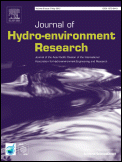
Journal of Hydro-environment Research
Exploring the intersection of engineering, chemistry, and water science.The Journal of Hydro-environment Research, published by Elsevier, serves as a leading platform for advancing knowledge in the fields of civil and structural engineering, environmental chemistry, and water science. With a robust impact factor reflecting its Q2 category ranking across various disciplines—including Environmental Engineering and Management, Monitoring, Policy and Law—it emphasizes high-quality research that addresses pressing environmental challenges. Embracing a global perspective, the journal explores interdisciplinary approaches to water and environmental management, thus empowering researchers and professionals to innovate and implement effective solutions. Since its inception in 2007, the journal has continually evolved, with its scope expanding into emerging areas pertinent to water science and technology. The journal is indexed in esteemed databases, ensuring wide dissemination and accessibility of published works, although it does not currently operate on an open access model. Addressing the intricate interplay between human activities and water resources, the Journal of Hydro-environment Research is quintessential for those dedicated to fostering sustainable practices and enhancing our understanding of hydro-environmental systems.

Hydrology Research
Exploring the depths of water management research.Hydrology Research, a leading academic journal published by IWA Publishing, is dedicated to advancing the field of water science and technology. With an impressive impact factor and a Q2 ranking in its category, the journal plays a pivotal role in disseminating innovative research and practices in hydrology. Established in 1973 and transitioning to an Open Access model in 2020, it provides unrestricted access to high-quality articles that cover a broad spectrum of topics, including hydrological processes, water management, and environmental impact assessments. Situated in Denmark, Hydrology Research continues to thrive as an essential platform for researchers, professionals, and students alike, encouraging the exchange of ideas that contribute to sustainable water solutions worldwide. With a comprehensive coverage of research converging from 1973 to 2024, it stands as a testament to ongoing progress in the water science community.
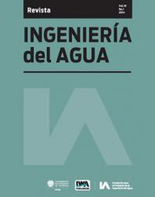
Ingenieria del Agua
Transforming Challenges into Opportunities in Water ManagementIngenieria del Agua, published by Universitat Politècnica de València, Editorial UPV, is a prominent open-access journal dedicated to the field of water engineering and management. With its ISSN 1134-2196 and E-ISSN 1886-4996, this journal has been facilitating the dissemination of critical research and innovative practices in water resources since 1994. With a commitment to providing unrestricted access to high-quality research, Ingenieria del Agua aims to serve as a pivotal platform for researchers, professionals, and students alike. Focused on the intersection of hydrology, environmental engineering, and sustainability, the journal encourages submissions that address contemporary challenges in water resource management, promoting advancements that are vital for both ecological conservation and societal needs. By fostering a collaborative academic environment, it plays an essential role in shaping the future of water engineering.

Water Resources
Transforming knowledge into action for water conservation.Water Resources, a prominent journal published by MAIK NAUKA/INTERPERIODICA/SPRINGER, focuses on the critical and evolving field of water science and technology. Established in 1976 and with a long-standing commitment to advancing knowledge, this journal explores interdisciplinary research that addresses the challenges surrounding water resource management, quality, and sustainability. With an impact factor positioned within the Q3 category of its field, it holds a notable Scopus rank (#181/261) in Environmental Science, emphasizing its role in driving scholarly discourse. While currently not open access, Water Resources provides vital insights for researchers, professionals, and students, making it an essential resource for those seeking to innovate and implement effective water management solutions. To stay ahead in a domain that is increasingly paramount to global sustainability efforts, consider engaging with the latest research published in this vital journal.